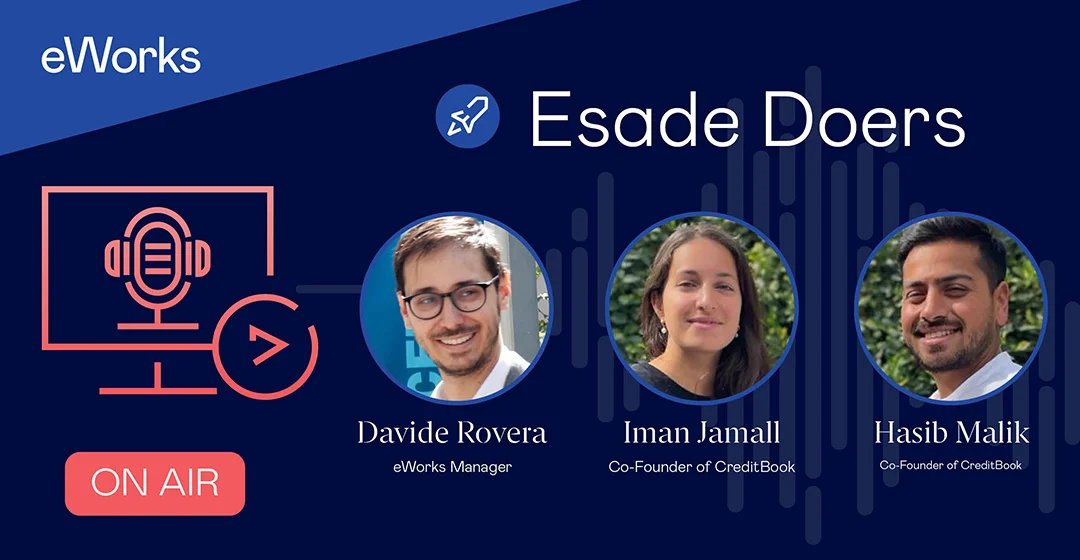Esade Entrepreneurship Institute
"Don’t get too emotional, distance yourself and build through evidence and data"

Listen to this podcast via Spotify | Apple Podcasts | Google Podcasts
Small businesses play a vital role in driving economic growth and creating employment opportunities, particularly in developing countries. This is why Davide Rovera, Manager of eWorks, interviewed Iman Jamall and Hasib Malik, two Esade students, on the Esade Doers podcast series. The duo co-founded Creditbook, a technology-driven platform aimed at empowering small businesses in Pakistan. Through their innovative solution, Jamall and Malik are leveraging technology to address the specific needs and challenges faced by small businesses, ultimately fostering economic development and financial inclusion in the country.
>> Check the full interview here: https://dobetter.esade.edu/en/creditbook-iman-jamall-hasib-malik
Initiating the entrepreneurship journey
Iman Jamal's journey as an entrepreneur was not a deliberate choice but rather a series of decisions driven by her focus on solving emerging market problems with a human-centric approach. After conducting research on the financial situation in Pakistan, he realized there was an opportunity to support micro, small, and medium enterprises. Hasib, on the other hand, grew up witnessing the struggles and successes of his grandfather and father in their entrepreneurial endeavors.
Hasib Malik, on the other hand, was inspired by the entrepreneurial stories of his grandfather and father. Seeing their struggles and successes, he realized the potential of private enterprise to address inefficiencies in the system. Despite having no formal business or tech training, Hasib pursued further education and eventually co-founded CreditBook with Iman.
Later on, Mateo Bergato, also an Esade graduate, joined their team after initially working on a different project together. They had developed a business model to address public transportation problems in Karachi but later pivoted to focus on financial inclusion. Mateo now leads the data side of CreditBook.
Launching a startup during a crisis
The initial idea for CreditBook came from their observation of cash flow challenges faced by small corner shops in crowded urban areas. They noticed that credit transactions were often recorded using paper ledgers, leading to errors, lost records, and cash flow disruptions. To address this issue, they conducted experiments and developed a simple system that sends reminders to customers via SMS or WhatsApp, notifying them of their outstanding debts and repayment dates. This approach significantly improved cash flows and led to users gaining more confidence in their businesses. This generated further opportunities for growth, seeking loans or additional services from CreditBook.
In the early stages, CreditBook adopted a bootstrap approach, carefully managing their expenses while focusing on creating a scalable model. As their efforts gained traction, they secured support from strategic angel investors, providing them with the necessary resources to accelerate their growth. Eventually, they attracted institutional funding, which further validated the scalability and potential of their business.
The COVID-19 pandemic presented unforeseen challenges but also provided an opportunity for increased digital connectivity in Pakistan. CreditBook quickly adapted to the remote work culture, allowing them to tap into global talent and create a hybrid work environment. The pandemic also played a role in accelerating their fundraising efforts, as the importance of digital solutions became more apparent. After achieving traction and identifying the potential for scaling, they secured strategic angel investors and later raised institutional funding in early 2021.
Looking towards the future
Looking towards the future, CreditBook has ambitious plans to expand beyond their core services of reminders and credit management. By leveraging the vast amount of data collected through their platform, they aim to offer additional value-added financial services in collaboration with other organizations.
The platform is currently free, allowing them to learn from their customers and explore revenue channels based on those insights. They plan to introduce financial services based on validated experiments and user data.
Iman Jamal and Hasib Malik's dedication to solving real-world problems and their unwavering commitment to sustainability have positioned CreditBook as a leading player in Pakistan's fintech space. Their innovative approach has significantly improved the cash flows of small businesses, providing them with opportunities for growth and success. Their journey is a testament to the positive impact that technology can have on empowering entrepreneurs and driving economic progress.
